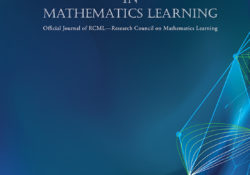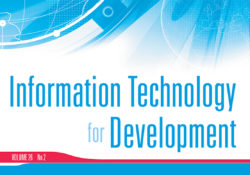tandfonline.com har udgivet en rapport under søgningen “Teacher Education Mathematics”: Social justice, education and peacebuilding: conflict transformation in Southern Thailand Link til kilde
Like this:
Like Loading...

tandfonline.com har udgivet en rapport under søgningen “Teacher Education Mathematics”: ABSTRACT ABSTRACT Ideas about social justice are influenced by the ontological and epistemological assumptions of the worldview in which they are located. Since the seventeenth century, the dominant worldview in the western hemisphere has been shaped by the separatist and deterministic principles of classical Newtonian science. During the twentieth century, with the advent of quantum physics, these principles have been contested from within science itself, indicating that the universe may instead be inter-relational, entangled and participatory. A historical investigation demonstrates how, despite findings from modern science, the Newtonian worldview has become deeply embedded in the western psyche, including in neoliberal politics, education, and educational research. As a counter-narrative, an alternative worldview is proposed, which is grounded in the ontological assumption… Continue Reading →
Like this:
Like Loading...
tandfonline.com har udgivet en rapport under søgningen “Teacher Education Mathematics”: Link til kilde
Like this:
Like Loading...
tandfonline.com har udgivet en rapport under søgningen “Teacher Education Mathematics”: ABSTRACT ABSTRACT With the widespread extraction of very large datasets, artificial intelligence using machine learning hold the promise to address socio-economic problems such as poverty, environmental safety, food production, security and the spread of disease. These applications entail Big Data for Development in which social problems, poverty, food security and responses to climate disasters can be solved in the most efficient and effective manner. This brave new world of solving pressing problems through machine learning has several dark sides. A data divide is being created that leaves the most vulnerable populations out of the solutions being created while discriminating against those whose data is churned by obscure algorithms. Complex mathematical models together with computing algorithms produce scores that are used… Continue Reading →
Like this:
Like Loading...
tandfonline.com har udgivet en rapport under søgningen “Teacher Education Mathematics”: Abstract Abstract The assumption that students are differently talented often underlies the public and philosophical debate about the justice of school systems. It is striking that despite the centrality of the notion of ‘talent’ in these debates, the concept is hardly ever explicated. I will suggest two explications: First, philosophers who point to different talents often assume that these are somehow fixed potentials that pose limits to what someone can achieve. According to this understanding, no matter how hard someone tries, she simply cannot perform well due to a lack of talent. Second, talking about different talents can be understood as saying that two students who will receive the same amount of educational resources are nevertheless expected to perform differently… Continue Reading →
Like this:
Like Loading...
tandfonline.com har udgivet en rapport under søgningen “Teacher Education Mathematics”: Abstract Abstract In this introduction to the PRIMUS Special Issue on Mathematics for Social Justice we provide a brief history of social justice in the context of undergraduate mathematics pedagogy and explain the purpose and motivation behind this movement in undergraduate education. Link til kilde
Like this:
Like Loading...
eric.ed.gov har udgivet: This two-part investigation (a) assessed the impact of the Jaime Escalante Math Program (JEMP), a structured summer mathematics intervention program, on the math achievement of urban middle school students, (b) identified the characteristics of the program that the administrators and teachers perceived to contribute to student achievement, and (c) compared the JEMP characteristics to those found in the literature on effective mathematics intervention programs. A mixed methods approach included analysis of two years of student math assessment data, administrator interviews, and teacher surveys. Quantitative findings indicate that student participants in the JEMP achieved significant growth in mathematics on two measures. Additionally, effective program elements are revealed in the qualitative data including specific classroom instructional strategies used in the JEMP. The results of this study will assist educators… Continue Reading →
Like this:
Like Loading...

tandfonline.com har udgivet en rapport under søgningen “Teacher Education Mathematics”: ABSTRACT ABSTRACT Traditionally emphasizing justice, equality and inclusion, education policies in the Nordic countries have incorporated neoliberal features during the last three decades, but to varying extents. These changes have important, multidimensional implications, but the variations have been addressed in few comparative Nordic studies. Thus, this article explores the potential to strengthen comparisons of education regimes in the Nordic countries generally, and social justice and marketization aspects more specifically, by using existing datasets and databases. It initially elaborates the concepts of justice and marketization of education. Using Iceland, Norway and Sweden as examples, it explores the relevance, accessibility and comparability of some of the larger international and national statistical databases, and hence their potential to enable such comparisons. These data… Continue Reading →
Like this:
Like Loading...
eric.ed.gov har udgivet: Educators today must be able to respond to the needs of an increasingly diverse student body and to teach all students the knowledge, skills, and attitudes needed for civic participation in a globalized, pluralist society. While state departments of education and national teacher organizations have begun to adopt global awareness in their teaching standards and evaluation tools, educators need to understand what globally competent teachers actually do in classrooms across subject areas and grade levels. This qualitative, multiple case study explores the signature pedagogies (Shulman, 2005) of 10 in-service teachers in one southeastern state who teach for global competence in math, music, science, English, social studies, and language classes across elementary, middle, and high schools. We found three signature pedagogies that characterized globally competent teaching practices across… Continue Reading →
Like this:
Like Loading...
tandfonline.com har udgivet en rapport under søgningen “Teacher Education Mathematics”: ABSTRACT ABSTRACT In this article, we approach large questions regarding justice and equality in the Nordic classrooms. A substantial body of previous research emphasises the importance of student engagement in teaching and learning. Drawing on video data from Norway, Sweden and Finland, we focus on whole-class teaching, i.e. situations in which the teacher addresses the class from the front of the classroom, to investigate justice trough participation. We have approached our topic through two concerns: student participation in classroom discourse and student engagement as providing access to content. Our findings seem to pose some serious challenges for the Nordic welfare society vision of classrooms as core societal hubs for justice and equality. While whole-class teaching is one of the primary… Continue Reading →
Like this:
Like Loading...







